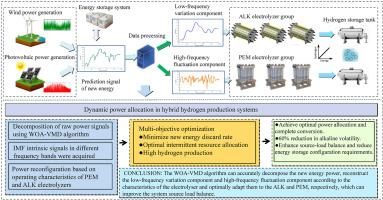Dynamic power allocation for the new energy hybrid hydrogen production system based on WOA-VMD: Improving fluctuation balance and optimizing control strategy
IF 8.1
2区 工程技术
Q1 CHEMISTRY, PHYSICAL
引用次数: 0
Abstract
The new energy hydrogen production system is subject to intermittent fluctuations, which compromise efficiency and equipment lifespan. This study proposes a new dynamic power allocation and control strategy for hybrid hydrogen production systems. By using the Whale Algorithm Optimized Variable Modal Decomposition (WOA-VMD), the fluctuating power of new energy is quantitatively decomposed and reconstructed. Based on a multi-objective optimization function, low-frequency variation components and high-frequency fluctuation components are accurately allocated between alkaline electrolyzers (ALK) and proton exchange membrane electrolyzers (PEM). The strategy effectively improves the source-load balancing capability, reducing the low-frequency fluctuation rate by 60% and reducing the high-frequency power amplitude by 70%, significantly reducing the operational demands on ALK electrolyzers, the capacity requirements of PEM electrolyzers, and the need for energy storage configuration, while also increasing hydrogen production efficiency by 7%. Compared to existing methods, the strategy has a transparent analysis process, strong interpretability, and good data reusability, making it valuable for engineering applications.

基于 WOA-VMD 的新能源混合制氢系统的动态功率分配:改善波动平衡并优化控制策略
新能源制氢系统受间歇性波动的影响,效率和设备寿命都会受到影响。本研究为混合制氢系统提出了一种新的动态功率分配和控制策略。利用鲸鱼算法优化变模分解(WOA-VMD),对新能源的波动功率进行定量分解和重构。基于多目标优化函数,在碱性电解槽(ALK)和质子交换膜电解槽(PEM)之间精确分配低频变化成分和高频波动成分。该策略有效提高了源载平衡能力,使低频波动率降低了 60%,高频功率幅值降低了 70%,显著降低了对 ALK 电解槽的运行要求、对 PEM 电解槽的容量要求以及对储能配置的需求,同时还使制氢效率提高了 7%。与现有方法相比,该策略分析过程透明、可解释性强、数据可重用性好,具有很高的工程应用价值。
本文章由计算机程序翻译,如有差异,请以英文原文为准。
求助全文
约1分钟内获得全文
求助全文
来源期刊

International Journal of Hydrogen Energy
工程技术-环境科学
CiteScore
13.50
自引率
25.00%
发文量
3502
审稿时长
60 days
期刊介绍:
The objective of the International Journal of Hydrogen Energy is to facilitate the exchange of new ideas, technological advancements, and research findings in the field of Hydrogen Energy among scientists and engineers worldwide. This journal showcases original research, both analytical and experimental, covering various aspects of Hydrogen Energy. These include production, storage, transmission, utilization, enabling technologies, environmental impact, economic considerations, and global perspectives on hydrogen and its carriers such as NH3, CH4, alcohols, etc.
The utilization aspect encompasses various methods such as thermochemical (combustion), photochemical, electrochemical (fuel cells), and nuclear conversion of hydrogen, hydrogen isotopes, and hydrogen carriers into thermal, mechanical, and electrical energies. The applications of these energies can be found in transportation (including aerospace), industrial, commercial, and residential sectors.
 求助内容:
求助内容: 应助结果提醒方式:
应助结果提醒方式:


